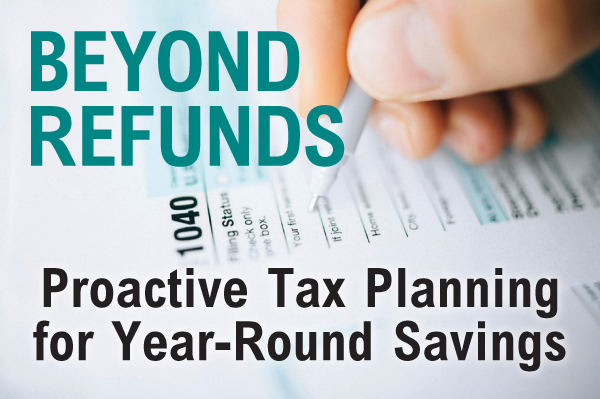
As a financial advisor with a tax background, I often help my clients with their taxes and regularly get asked tax questions, some of which are unique and interesting.
When April starts, many of us have already filed our tax returns and moved on. Most folks will not think about taxes again until 2025, but that could be a mistake. If I ask most people how much they got for a refund, they can tell me the exact amount, or within $500. If I ask how much tax you actually paid, meaning the amount the IRS kept, most are hard pressed to answer. That’s exactly what the government wants, because you might be mad if you knew the answer. Your refund is only the amount you overpaid, but how much of your money did the government actually keep?
I recently heard a tax professional say that there are two tax systems: one for the informed and one for the uninformed. In my 15 years as a tax professional before becoming a financial advisor, I never heard of the IRS auditing people because they paid too much. You are permitted to report your gross income and choose to take none of the deductions you are entitled to, and choose to simply pay taxes on all the money you make.
Some people are in a position where they will make less income during a year, or none at all, and this is a great time to take steps to lower taxes in a future year. It could be that you lost your job, you took time off to care for a baby or parent, or perhaps you retired—so your income will be less. In any of these cases, it may be a great time to convert retirement dollars from traditional to Roth. It could also be a good year to incur some capital gains by selling appreciated property that could be taxed at 0%.
I have a client who inherited stock from a parent which was worth only a fraction of what the parent paid. They sold the stock at a loss. This was the opportunity to proactively generate gains of a similar amount and offset the capital gains with the losses they were already planning to take. This is because the IRS allows you to offset capital gains with capital losses and then you can buy the gain stock back immediately for the current market price and not have to pay taxes on it in the future. Here is an example of how this works: Assume you have one stock that you bought for $6,000 and it’s now worth $10,000. You also have a different stock that has lost $4,000 that you don’t think will rebound. You end up selling the loss shares, and the gain stock as well. This means you can then use the loss to wipe out the gain and then immediately buy the gain stock back for $10,000 and now you don’t have to pay taxes on that stock until it goes up above $10,000.
On the other side of the planning spectrum, two different people who didn’t consult with me ahead of time cashed out part of their retirement accounts prior to age 59.5 (after which you avoid a 10% early withdrawal penalty). One of them ended up giving over 50% of the cashed-out amount to the government in taxes and penalties. How does that happen? He ended up in the 37% tax bracket, incurred the 10% early withdrawal penalty and owed their home state 5% income taxes. Taking a loan out on their property would have been a much better strategy.
There are a lot of other strategies you can take advantage of, assuming you are actively planning during the year rather than waiting until next year when there is no opportunity to plan for 2024.
Understanding the tax brackets and how you can take advantage of them is important to discuss with your financial advisor and your accountant, should you have any questions.
One misconception is that your tax professional/CPA will be able to get you the largest deduction. This is only based on what actually happened, not what you didn’t plan for. Most people don’t hire a CPA to do planning, but rather to prepare their tax returns. Ideally you would be working with both your financial advisor and your CPA to get to the optimal result. In the end, the fees you pay to your financial planning team can pay you back in tax savings.
(Disclaimer: The information in this article is not tax, legal or investment advice. Please consult your financial advisor and your CPA for specific tax questions that apply to your situation.)












